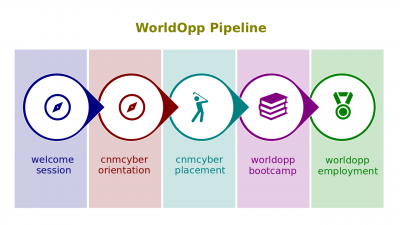Difference between revisions of "Who Whistleblower Is"
| (17 intermediate revisions by 2 users not shown) | |||
| Line 1: | Line 1: | ||
| − | [[Who Whistleblower Is]] (hereinafter, the ''Lectio'') is the second [[lectio|lesson part]] of the '''[[ | + | [[Who Whistleblower Is]] (hereinafter, the ''Lectio'') is the second [[lectio|lesson part]] of the '''[[Labor Regulations]]''' [[lesson]] that introduces its participants to [[labor law]]s and related [[regulatory compliance]]. |
| − | [[File:Educaship-pipeline.png|400px|thumb|[[WorldOpp Pipeline]]]]This ''lesson'' belongs to the [[Introduction to Employment]] session of | + | [[File:Educaship-pipeline.png|400px|thumb|[[WorldOpp Pipeline]]]]This ''lesson'' belongs to the [[Introduction to Employment]] session of [[EmployableU Concepts]]. |
==Content== | ==Content== | ||
| − | The predecessor [[lectio]] is [[ | + | The predecessor [[lectio]] is [[Protected Groups]]. |
| − | === | + | ===Script=== |
| − | : | + | :[[Whistleblower]] is a person who exposes one's wrongdoing, secretive information or activity that is deemed illegal or unethical. |
| − | : | + | |
| − | + | :''Whistleblowers'' may expose corruption, fraud, threat to public interest and/or national security, as well as violation of regulations. ''Whistleblowers'' usually have a choice to expose their information internally or externally. | |
| + | |||
| + | :''Whistleblowers'' commonly take the risk of facing retaliation from the alleged wrongdoers. In the [[United States]], some laws have been enacted to protect [[whistleblower]]s from potential retaliation that may otherwise include termination of employment, demotion, suspension, threats or harassment, and discrimination. | ||
| + | |||
| + | :The [[OSHA's Whistleblower Protection Program]] is the main application that is responsible for protecting the rights of employees, who may fear job loss or other reprisals if they speak up. Workers who feel they have suffered retribution for reporting company violations should file a complaint with their local OSHA office within 30 days of the incident. | ||
| − | + | :The [[Whistleblower Protection Act]] is the federal [[labor law]] that was initially enacted in 1989 and enhanced in 2012 that specifically protects those people who work for the [[United States Federal Government]] and report on illegal or improper activities conducted by this government or its parts. | |
| − | :The | ||
| − | : | + | ===Key terms=== |
| + | :[[Whistleblower]], [[OSHA's Whistleblower Protection Program]], [[Whistleblower Protection Act]] | ||
| − | : | + | ===Closing=== |
| + | :Would you be able to argue that whistleblowers are important? --Yes/No/Let's move on for now | ||
| − | |||
| − | |||
'''[[What Recruitment Is]]''' is the successor [[lectio]]. | '''[[What Recruitment Is]]''' is the successor [[lectio]]. | ||
| − | == | + | ==Questions== |
| + | |||
| + | ===Placement entrance exam=== | ||
Latest revision as of 21:33, 29 October 2023
Who Whistleblower Is (hereinafter, the Lectio) is the second lesson part of the Labor Regulations lesson that introduces its participants to labor laws and related regulatory compliance.
This lesson belongs to the Introduction to Employment session of EmployableU Concepts.
Content
The predecessor lectio is Protected Groups.
Script
- Whistleblower is a person who exposes one's wrongdoing, secretive information or activity that is deemed illegal or unethical.
- Whistleblowers may expose corruption, fraud, threat to public interest and/or national security, as well as violation of regulations. Whistleblowers usually have a choice to expose their information internally or externally.
- Whistleblowers commonly take the risk of facing retaliation from the alleged wrongdoers. In the United States, some laws have been enacted to protect whistleblowers from potential retaliation that may otherwise include termination of employment, demotion, suspension, threats or harassment, and discrimination.
- The OSHA's Whistleblower Protection Program is the main application that is responsible for protecting the rights of employees, who may fear job loss or other reprisals if they speak up. Workers who feel they have suffered retribution for reporting company violations should file a complaint with their local OSHA office within 30 days of the incident.
- The Whistleblower Protection Act is the federal labor law that was initially enacted in 1989 and enhanced in 2012 that specifically protects those people who work for the United States Federal Government and report on illegal or improper activities conducted by this government or its parts.
Key terms
Closing
- Would you be able to argue that whistleblowers are important? --Yes/No/Let's move on for now
What Recruitment Is is the successor lectio.
